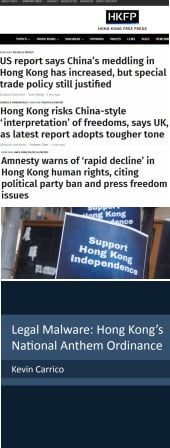In the Japanese system of 72 micro-seasons, this week is when ‘Sparrows Start to Nest’ gives way to ‘First Cherry Blossoms’. This ancient calendar originated in China, where this time of the year is now known as ‘Bad Surveys of Hong Kong Bloom’.
The first was the US State Department’s human rights report, which expressed concern over disqualification of lawmakers, the banning of the HK National Party, the expulsion of a Financial Times editor and so on. This was followed by State’s annual Hong Kong report, which similarly expressed concern about the city’s declining autonomy and the impact on business confidence. A few days later, the UK government published its six-monthly report, saying much the same things. Amnesty International joined in with its annual review, which criticized the use of national security as a pretext for restricting freedom of expression and other rights.
All this barbarian meddling prompts predictable whiny panda-tantrums and panty-wetting. By accusing China of interfering in Hong Kong’s domestic matters, you are interfering in China’s internal affairs.
And just a few hours ago, Hong Kong Watch released a paper by academic Kevin Carrico dedicated to a prime example of the ongoing Mainlandization of Hong Kong – the  forthcoming national anthem law. Unlike the other documents, which list a wearying succession of major and minor setbacks, this both explains background and gets into specifics about one piece of ‘legal malware’ that will significantly weaken Hong Kong’s freedoms and rule of law (and it has pictures, and references a hip-hop group, etc).
forthcoming national anthem law. Unlike the other documents, which list a wearying succession of major and minor setbacks, this both explains background and gets into specifics about one piece of ‘legal malware’ that will significantly weaken Hong Kong’s freedoms and rule of law (and it has pictures, and references a hip-hop group, etc).
The 24-page document is here; a summary is here.
This proposed law, the author says, “incorporates untenably vague definitions of insult [of the anthem], while … giving the authorities unreasonably extended time periods in which to pursue prosecution, along with excessive prison terms of up to three years for thought and speech crimes…” He gives examples of how the law could be used – by design – for politicized prosecutions. And he points out that by using Annex III of the Basic Law, Beijing is creating a new precedent to force more such restrictive legislation on Hong Kong at will.
While we’re on this depressing subject, what will be left of Hong Kong’s autonomy by 2047? (the article mentions another that describes Beijing’s plan for the city as ‘purge and merge’, so at least we get a zippy slogan out of it).
Here’s cartoonist Zunzi’s view.
Before slashing our wrists in despair, we might also ask what will be left of China by that time, if the regime maintains its current spiral of more clampdowns, more ideology, more military spending, more brainwashing, more anti-reformism, more centralization and more Party?


Hong Kong’s strategic value to the CCP is as a credible international financial centre.
At the heart of that lies Hong Kong’s civic freedoms and independent judiciary
The stepped-up pace of mainlandisation suggests that the CCP are confident that the barbarians will not abandon Hong Kong as their preferred venue for enforcement of China-related contracts.
I think their confidence is misplaced and that Hong Kong poses a major, unseen vulnerability to the CCP regime.
The last five dynasties lasted an average of 190 years. If you think of the CCP as modern Chinese dynasty, actuarially, we’ve got another 120 years to go.
By 2047, the demographics of the PRC will mean that it’s finished: run out of money to pay the by-then retired PLA of today. The peasants will starve because their crops will be taken from them to feed the CCP members. The Council on Foreign Bondholders will reconvene after a 60 year recess.
In 1986, having stiffed its creditors to the equivalent then of about 80% of PRC reserves, the CCP wanted its gold, then held by Barings in London. This was because the PLA had been creamed by the Vietnamese in 1979’s border-war and the PLA needed new equipment. But that came at a price: readmission to the international markets meant no gold!